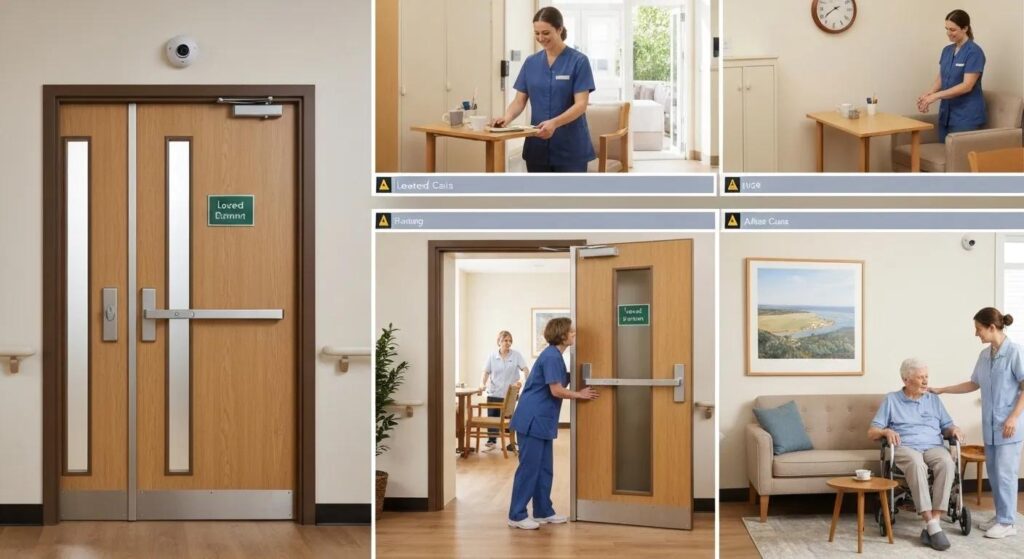Why Memory Care is a Great Option for You: Benefits, Safety, and Support
Memory care delivers specialized support for individuals with dementia and Alzheimer’s Disease by combining secure environments, expert caregiving, and tailored activities that enhance cognitive function and daily well-being. Recognizing the challenges of memory impairment, families often struggle with safety concerns, complex care routines, and social isolation; memory care offers a solution by integrating 24-hour supervision, personalized plans, and meaningful engagement.
Benefits of Memory Care for Dementia Patients
Memory care facilities are designed to provide a safe and supportive environment for individuals with dementia and Alzheimer’s disease. These facilities offer specialized care, including 24-hour supervision, personalized care plans, and engaging activities, all aimed at enhancing cognitive function and overall well-being.
This research supports the article’s claims about the benefits of memory care, including safety, support, and specialized programs.
In this guide, you will discover: a clear definition of memory care and its ideal candidates; safety measures that prevent wandering and accidents; the expertise memory care staff bring; how art, music, and physical therapies improve life quality; ways memory care promotes independence; caregiver relief strategies; cost factors and financing options; and a direct comparison to assisted living. By the end, you will be equipped to evaluate memory care in Oklahoma or beyond as the best option for your loved one.
What Is Memory Care and Who Is It For?
Memory care refers to a structured, secure residential service designed specifically for people with moderate to severe cognitive impairment. It addresses the progression of dementia and Alzheimer’s Disease by providing purpose-built spaces, routine-driven schedules, and therapeutic programs. For example, a resident experiencing frequent confusion benefits from a consistent timetable and enclosed walking paths that reduce anxiety and promote engagement, which prepares the ground for understanding its safety features.
What Does Memory Care Include for Dementia and Alzheimer’s Patients?
Memory care includes a blend of medical support, cognitive stimulation, and personal assistance. Staff deliver memory-focused therapies such as reminiscence activities, manage daily medications, and implement behavior-management techniques to reduce agitation. Structured meals, wayfinding cues, and social groups complete a holistic program that meets both health and emotional needs, which leads naturally into examining who gains the most.
Who Can Benefit Most from Memory Care Services?
Those with advancing memory loss, wandering behaviors, or frequent medication errors gain the greatest benefit from memory care services. Individuals showing signs of disorientation, difficulty with daily tasks, or social withdrawal thrive in environments that minimize hazards and optimize engagement. Family caregivers also benefit by delegating complex care tasks, easing stress and boosting their own well-being, which sets the stage for contrasting memory care with other senior living options.
How Does Memory Care Differ from Other Senior Living Options?
Memory care differs from independent living or assisted living through specialized architecture, enhanced staffing ratios, and dementia-specific training. While assisted living supports general ADLs, memory care adds secure perimeters, cognitive therapy programs, and staff skilled in dementia communication methods. Understanding these distinctions clarifies why safety and security remain a primary focus in memory care.
How Does Memory Care Ensure Safety and Security for Residents?
Memory care environments are engineered to prevent common risks and support mobility within secure zones. Enclosed hallways, alarmed exits, and smooth transitions between indoor and outdoor spaces define a facility’s protective design. For instance, an enclosed garden with a visible walking loop allows residents to explore freely without risk of wandering, paving the way to discuss key safety measures.
What Are the Key Safety Measures in Memory Care Facilities?

Memory care facilities implement locked doors with keypad access, unobtrusive surveillance, and clear signage to guide residents. Furniture layouts minimize fall hazards, and emergency call systems respond instantly to requests. These measures interconnect to create a low-risk environment that supports confidence and independence, leading to how supervision complements them.
How Does 24-Hour Supervision Protect Residents?
Continuous supervision ensures immediate assistance during behavioral episodes, daily routines, or health emergencies. Care teams trained in dementia care maintain active monitoring, conduct regular checks, and use wearable alert devices. This uninterrupted support reduces falls and confusion, which underscores the critical nature of wandering prevention.
Why Is Wandering Prevention Critical in Memory Care?
Wandering poses severe risks such as injury, exposure, and increased anxiety for individuals with memory loss. Preventing unsupervised exits and offering safe walking paths protect physical health and promote tranquility. Effective wandering prevention promotes structured exploration and builds trust, which transitions naturally into specialized care responsibilities.
Wandering Prevention in Memory Care
Wandering is a significant risk for individuals with dementia, and memory care facilities implement various measures to prevent it. These measures include secure environments, locked doors, and supervised outdoor spaces, all designed to protect residents from injury and anxiety.
This source provides evidence for the importance of safety measures in memory care, specifically addressing wandering prevention.
What Specialized Care and Expertise Do Memory Care Staff Provide?
Memory care staff combine geriatric training with behavioral techniques to support residents’ unique needs. They assess cognitive levels, personalize care plans, and apply therapeutic interventions. For example, a nurse specializing in dementia observes mood changes and adjusts engagement strategies, which leads into exploring staff training specifics.
How Are Staff Trained to Support Dementia and Alzheimer’s Patients?
Care teams receive certification in memory care best practices, including validation therapy, de-escalation methods, and neurological care protocols. Regular workshops and cross-disciplinary collaborations ensure skills stay current with research on cognitive decline. This professional expertise guarantees compassionate, informed support and informs the design of individualized plans.
What Is Included in Individualized Care Plans?
Individualized care plans outline daily routines, therapeutic goals, nutritional guidelines, and social schedules tailored to each resident’s history and cognitive profile. Plans specify memory triggers, preferred activities, and behavior-management approaches, ensuring consistency across all shifts. Clear plan documentation fosters continuity and effective medication management.
How Is Medication Management Handled in Memory Care?
Medication management in memory care involves scheduled administration, pill dispensers with alarms, and oversight by licensed nurses. Staff verify dosages, monitor side effects, and coordinate with physicians for adjustments. This diligence enhances adherence and safety while reducing caregiver stress.
How Do Engaging Activities and Therapies Improve Quality of Life?

Tailored activities stimulate cognition, encourage social bonds, and give purpose to daily life. Memory care programs integrate art, music, and movement therapies that tap into preserved abilities and memories. For example, a music therapy session using familiar songs can evoke emotional connections, prompting further exploration of daily activity routines.
What Types of Therapies Are Offered in Memory Care?
- Art Therapy that leverages painting and sculpting to reinforce motor and cognitive skills.
- Music Therapy that uses melody and rhythm to trigger memory recall and emotional stability.
- Reminiscence Therapy that prompts discussion around photographs and mementos to reinforce identity.
Each therapy targets neural pathways to preserve cognitive function and foster positive emotional states.
How Do Daily Activities Support Cognitive Function and Well-being?
Structured daily activities such as gardening, cooking demonstrations, and gentle exercise sessions maintain routine and purpose. These group interactions reduce isolation and support executive functioning through planning, sequencing, and collaboration. A consistent routine also minimizes distress and encourages mastery of tasks.
Why Is Physical Therapy Important for Memory Care Residents?
Physical therapy enhances mobility, balance, and strength, reducing fall risks and promoting independence. Exercises tailored to each resident’s abilities improve circulation, joint flexibility, and mood through endorphin release. A stronger body supports better engagement in other therapies and ADLs.
How Does Memory Care Promote Resident Well-being and Independence?
Memory care fosters dignity by respecting preferences and enabling as much self-direction as possible. Assistance with ADLs is calibrated to fill gaps and encourage success, while nutrition plans support cognitive health. For instance, offering choices during meal selection supports autonomy and prepares for caregiver relief practices.
What Assistance Is Provided for Activities of Daily Living (ADLs)?
Assistive care for bathing, dressing, grooming, and eating is offered with respectful prompts and hands-on support as needed. Staff encourage residents to perform tasks at their own pace, reinforcing confidence and self‐efficacy. This balance of support and independence builds daily structure.
How Is Nutrition Managed to Support Health?
Nutrition plans in memory care include nutrient-dense meals, texture modifications, and scheduled snack times to address appetite changes common in dementia. Hydration monitoring and supplement options maintain energy levels and prevent dehydration. Proper nutrition contributes to cognitive resilience and physical well-being.
How Does Memory Care Help Maintain Resident Dignity and Independence?
By customizing assistance levels, providing choice-based activities, and celebrating personal milestones, memory care preserves self-worth. Residents remain engaged in communal events and decision-making, strengthening social identity. These practices foster a sense of purpose and seamless transition into caregiver support structures.
How Does Memory Care Provide Peace of Mind and Support for Caregivers?
Memory care alleviates caregiver burden by shifting complex tasks to professional teams, reducing stress and burnout. Clarity around daily routines and open communication channels empower families to stay connected without constant supervision. For instance, respite options allow caregivers to recharge, segueing into the challenges they face.
What Are Common Challenges Faced by Caregivers of Dementia Patients?
Caregivers often encounter emotional exhaustion, anxiety over safety, and difficulty managing behavioral symptoms. Juggling medical appointments, medications, and daily supervision can lead to chronic stress. Recognizing these challenges highlights why professional support is indispensable.
How Does Memory Care Alleviate Caregiver Burden?
Professional care teams assume responsibility for health monitoring, activity coordination, and behavioral management. Scheduled family meetings and progress reports offer transparency and involvement. Respite periods enable caregivers to recover and maintain their own health.
How Can Family Relationships Improve with Memory Care Support?
With reduced crisis events and structured visitation programs, families interact more positively and focus on meaningful moments. Memory care communities often facilitate group celebrations and memory workshops that strengthen familial bonds. These interactions restore relational quality.
What Are the Costs of Memory Care and How Can You Finance It?
The cost of memory care varies by service level, facility features, and geographic location. Expenses typically cover accommodation, care staffing, therapies, and specialized amenities. Understanding cost drivers helps families explore funding through public and private options.
What Factors Influence the Cost of Memory Care?
Key factors include staff-to-resident ratios, round-the-clock supervision, therapeutic programs, secure facility design, and meal services. Higher staff expertise and specialized equipment may elevate fees. Geographic factors and facility age also affect pricing.
How Do Medicaid, Medicare, and Veteran Benefits Help Cover Memory Care?
Medicaid may cover long-term residential care for eligible individuals, while Medicare Part A may contribute to short-term skilled nursing stays. VA veterans’ benefits include Aid and Attendance pensions that offset memory care costs. Verifying eligibility criteria ensures optimal utilization.
What Other Financial Assistance Options Are Available?
Private long-term care insurance, reverse mortgages, life insurance conversions, and state assistance programs offer supplementary funding. Pensions and Social Security benefits also support monthly expenses. Exploring mixed funding strategies maximizes affordability.
What Are the Key Differences Between Memory Care and Assisted Living?
Memory care and assisted living differ in specialization, security measures, staff training, and cost. A structured comparison clarifies these distinctions for decision-making purposes.
| Entity | Attribute | Memory Care | Assisted Living |
|---|---|---|---|
| Level of Care | Focus | Dementia-specific cognitive support | General ADL assistance |
| Staff Training | Expertise | Certified dementia care professionals | Basic caregiving and personal care |
| Security Features | Environment | Secure entry/exit controls, alarms | Unlocked or semi-secure access |
| Therapeutic Programs | Cognitive Stimulation | Art, music, reminiscence therapies | Occasional social activities |
| Cost Range | Monthly Fee | Higher due to specialized services | Lower compared to memory care |
How Do Levels of Care Differ Between Memory Care and Assisted Living?
Memory care provides intensive cognitive interventions, behavior management, and structured routines, whereas assisted living supports more independent residents with minimal cognitive impairment. This specialized intensity ensures safer, more effective care for those with memory loss.
What Are the Differences in Staff Training and Expertise?
Memory care staff undergo advanced dementia certification, including behavioral psychology and neurology fundamentals. Assisted living teams focus on general caregiving without specialized dementia protocols. Enhanced training in memory care results in deeper understanding of cognitive symptoms.
How Do Security and Safety Features Compare?
Memory care facilities utilize locked doors, monitored perimeters, and secured outdoor spaces designed for safe wandering. Assisted living often permits more open access, which can pose risks for residents prone to confusion or wandering. Advanced security in memory care minimizes accidents.
How Do Costs Compare Between Memory Care and Assisted Living?
Monthly costs for memory care average 10-20% higher than assisted living due to specialized staff, secure environments, and dedicated therapies. In contrast, assisted living offers basic personal care at lower rates but may require additional services for memory support.
How Can You Make an Informed Decision About Memory Care for Your Loved One?
Choosing a memory care community involves evaluating care philosophy, staff credentials, facility safety, and community culture. Visits and expert consultations help families prioritize the factors that matter most to individual residents.
What Questions Should You Ask When Choosing a Memory Care Facility?
Ask about staff certification in dementia care, resident-to-staff ratios, emergency protocols, therapy schedules, and family communication practices. Understanding these elements reveals a facility’s commitment to quality and transparency.
How Can Consulting Physicians and Dementia Experts Help?
Physicians and geriatric specialists assess cognitive levels and recommend appropriate care intensity. Dementia experts guide families through behavioral strategies and long-term planning. Their insights ensure alignment between medical needs and community services.
What Are the Benefits of Visiting and Touring Memory Care Communities?
In-person tours showcase daily routines, social interactions, and facility design. Observing mealtimes, activity sessions, and staff engagement provides firsthand insight into resident experience. Tours clarify whether the environment matches personal preferences and care requirements.
Memory care offers a secure, supportive environment that enhances cognitive function, promotes independence, and relieves caregiver stress. By integrating specialized therapies, 24-hour supervision, and personalized care plans, it addresses the unique challenges of dementia and Alzheimer’s patients. Families in Oklahoma and beyond can explore funding options through Medicaid, Medicare, and veterans’ benefits to make this empowering choice. Visiting facilities, consulting experts, and asking targeted questions ensure you select the memory care community that best honors your loved one’s dignity and well-being.




